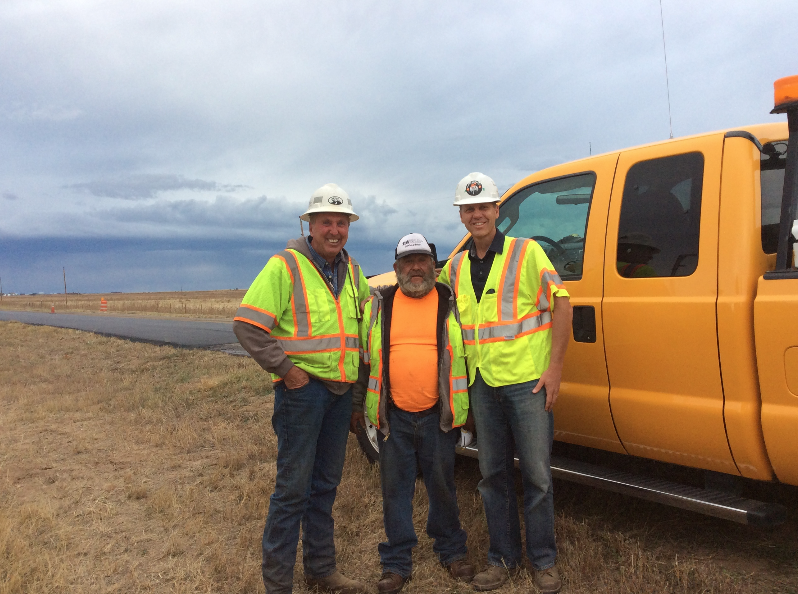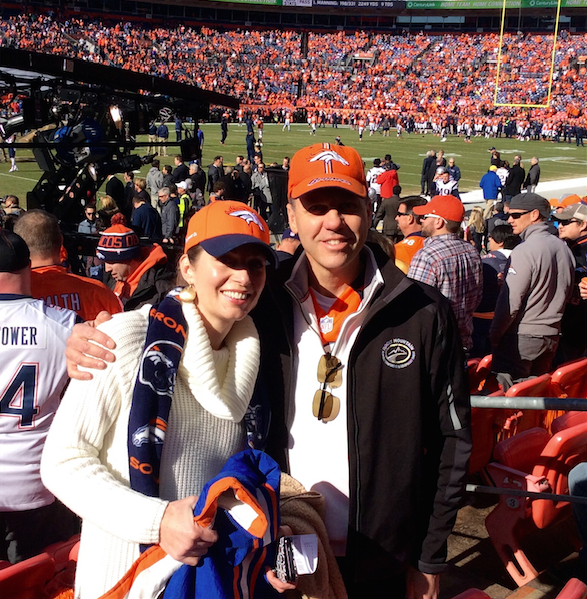Meet the State Exec: Thomas Peterson
BY AsphaltPro Staff


Tom Peterson (at right) with Jim MacDonald (at left) and Ismael Cornejo (center) both of APC Southern Construction Co., Golden, Colorado, meet out in the field to check out a project in progress. Photos courtesy Tom Peterson.
By AsphaltPro Staff
We continue the introduction to state asphalt pavement association (SAPA) executive directors with Colorado’s Thomas Peterson, P.E. He brings a Bachelor of Science degree in Civil Engineering from the University of Minnesota and Master of Science degree in Civil Engineering from Purdue University to his post.
State Association:
Colorado Asphalt Pavement Association (CAPA), Centennial, Colorado
How long have you been in the asphalt industry?
27 years (18 with CAPA, 9 with FHWA)
“Although it has been many years since I was in college, it is still great to stay in touch with those I went to school with and follow their career paths. One example is Pat Huston (BS Civil Engineering, U of Minnesota, 1988), who is currently the project director for the $153 million SH53 relocation project in northern Minnesota for the Minnesota DOT.”
In what year was your state association formed?
1983
How many producer and/or contractor members are in your state association?
24 producer members and 22 laydown contractors (about 90%)
What are the top two or three ways you have increased membership in the association?
Expanding our training and education program; partnering with the DOT and municipal agencies; providing support on environmental and regulatory issues
What is your favorite method for recruiting new asphalt professionals to the industry in general?
We offer reduced fees for our training and education courses. This is a very tangible way to show value to members.
In what month do you hold your annual meeting?
February
Do you have a trade show/expo in addition to your annual meeting?
Yes (The Rocky Mountain Asphalt Conference and Exhibit Show takes place annually in Denver)
Do you have a staff that assists in preparing the annual meeting?
Yes
Does your office/staff hold educational seminars or webinars for members separate from the annual meeting throughout the year?
Yes
About how many member asphalt projects do you visit per year/paving season?
20
About how many member asphalt plant tours do you assist/are you a part of per year?
5 to 10
About how many member asphalt open house events do you attend per year?
3 to 5
About how many state agency or DOT meetings do you attend per year?
20 to 30
On a scale of 1 to 5 (1 being none at all; 5 being very much), how much of a threat to your members’ marketshare/livelihood is the concrete industry in your state?
3
Could you share an example of a time when the concrete industry encroached on the asphalt marketplace in your state?
The pavement type market share is very competitive in Colorado. We continue to advocate for the use of asphalt in heavy truck volume high traffic applications. If designed, constructed and maintained properly, asphalt pavements can continue to be the preferred pavement type in a majority of applications.
On a scale of 1 to 5 (1 being none at all; 5 being very much), how much difficulty are your members having in finding qualified workers for their asphalt paving or production crews?
5

Tom and Linda Peterson cheer the Broncos onto the Superbowl.
Could you share some of the hindrances to workforce development in your state?
The stigma of the construction industry; hard work, in the elements; long hours, seasonal, low pay, blue collar, etc.
Could you give an example of a way your state APA assists members with workforce development?
We have established partnerships with a couple of the key construction management programs in the state, namely, Colorado State University and Colorado Mesa University. The programs now include asphalt materials and construction education in the undergraduate curriculum.
On a scale of 1 to 5 (1 being none at all; 5 being very much), how involved are your state elected officials in transportation issues such as funding and infrastructure improvements?
4
On a scale of 1 to 5 (1 being none at all; 5 being very much), how involved are your asphalt members in transportation issues such as funding and infrastructure improvements?
4
Could you share an example of a time when CAPA hosted elected officials to educate them on the need for highway funding, etc.?
Over the past year we have met with a state legislator regarding the environmental impact of an asphalt production facility. The district of the legislator includes a very vocal citizen group that doesn’t like that they are neighbors to an asphalt plant. Although the plant has been in operation for years and well before citizens moved near the plant, the citizen group had approached the legislator to impose restrictions that were above and beyond the state permit requirements. We met with the legislator and explained the impacts of the legislation and the requirements that the operator is currently required to meet. The legislator rescinded the legislation and does not support any additional requirements.

Tom Peterson
Get to Know Tom Peterson
Why (or how) did you join the asphalt industry?
I grew up in Northern Minnesota and my dad was in the contract hauling business with his brothers. They had a fleet of 20 or so dump trucks and hauled sand, gravel and asphalt. So, I have been around asphalt and construction my whole life. I was not a good truck driver and have a great appreciation for the trade.
What do you see as the most important part of your job as an executive director of a SAPA?
The most important part of my job is to add value to the members. Some of our activities are intended to aid the entire industry but some of our activities are at the request of individual members. Striking the proper balance of focus (entire industry and individual members) is critical for success.
What is the most challenging part of your job?
Every year is different and the challenges and priorities change over time. We need to stay proactive to add value to our members. These challenges include technology transfer of new technology (for example warm mix asphalt), work force development, good economy, bad economy, environmental requirements. Partnerships with universities, etc.
What do you find most enjoyable about your job as an executive director of a SAPA?
One very enjoyable part of my job is developing partnerships with other organizations. In Colorado, we have worked hard to develop a great relationship with the Colorado DOT, the American Public Works Association – Colorado Chapter, Colorado State University, etc. We have found that these partnerships expand our ability to meet our mission and better serve the asphalt industry of Colorado.
